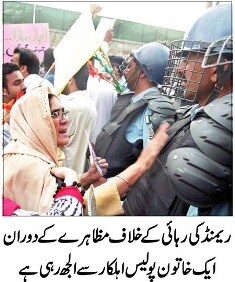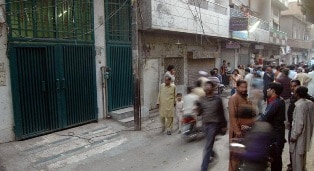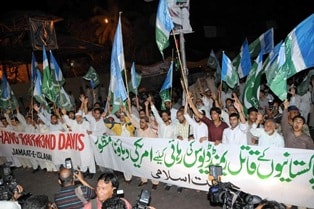Protests erupted in towns across Pakistan after Raymond Davis, the CIA contractor whose arrest on double murder charges in Lahore threatened to sink Pakistan-U.S. relations, was released on March 16 under an agreement for blood money.
Soon after the release, protesters led by various religious and political organizations such as the Jamaat-e-Islami Pakistan, Pakistan Tehreek-e-Insaf party, Pasban (a religious-political pressure group), turned out in Pakistani streets and outside the U.S. Embassy and consulates to register their anger over Raymond Davis's release. More anti-U.S. protests are expected in Pakistan in coming days over the issue:

A part of the document for diyat (blood money) signed by the relatives of Faheem and Faizan, the two victims of Raymond Davis, and produced in the Pakistani court. In the above image, Parveen Akhtar, mother of Faizan, signed the agreement stating that she received 33,333,333.00 Pakistani Rupees without any greed or coercion. (Image courtesy: Roznama Jang, Pakistan, March 17, 2011)
Controversy Over Payment of "Blood Money" to the Families of the Deceased
According to a report in the Urdu-language newspaper Roznama Jang, an amount of 200 million Pakistani Rupees was given to the relatives of the two victims – Faheem and Faizan who were shot dead by Raymond Davis – as part of diyat (agreement for blood money). Various Pakistani websites published the images of the diyat agreement, which was accepted by the Lahore court as per Pakistani/Islamic laws.[1] As U.S. Secretary of State Hillary Clinton denied that the U.S. paid the blood money, a report in the Urdu-language daily Roznama Ummat noted that the money was paid by the Pakistani government.[2]
The Roznama Jang newspaper carried another report noting that Shahbaz Sharif, the Chief Minister of Punjab province, became active in working for the release of Raymond Davis following a Saudi request.[3] Davis was held in the Kot Lakhpat prison of Lahore, the capital of Punjab province.
Pakistani Government Body to Review All Pakistani Treaties
In a development perhaps not directly related to the Raymond Davis issue, the Council of Islamic Ideology (CII), an oversight body set up under the Pakistani constitution, disclosed that it will review all international treaties signed by Pakistan between 1947 and 2007 for their compliance with Islam. The CII regularly vets Pakistani laws for their compliance with the principles and concepts of Islam as enunciated in the Koran and Sunna (the deeds and sayings of Islam's Prophet Muhammad). CII Chairman Maulana Muhammad Khan Sherani said: "Pakistan's agreements with international community are like laws, and the council is planning to review the treaties in line with the Holy Koran and Sunna."[4]
Prominent Pakistanis Vow Protests
As Pakistani protesters turned out in streets, Lieutenant-General (retired) Hamid Gul, the former chief of Pakistani military's Inter-Services Intelligence (ISI), vowed that he and his ailing wife would lead a protest in Islamabad against the release of Raymond Davis. Describing his release as an "historic injustice," Gul said that the decision to release him proves that Pakistani leaders are "slaves of the U.S." and freeing the CIA contractor could endanger the security of Pakistan.[5]
Dr. Fauzia Siddiqi, sister of Pakistani scientist Dr. Aafia Siddiqi who has been sentenced in the U.S. to 86 years imprisonment for trying to kill U.S. soldiers in Afghanistan, reacted to the news of Davis's release, stating that the Pakistani government lost an opportunity to secure her sister's freedom in exchange for Raymond Davis. Noting that she had the sinking feeling that the Pakistani government will release Raymond Davis, Dr. Fauzia Siddiqui – who has emerged as a leading anti-U.S. campaigner in Pakistan – vowed that the Free Aafia Movement will continue against the U.S.[6]
The Ex-Servicemen's Society, a powerful pressure group of former Pakistani military generals, protested against Davis's release by criticizing the Pakistani government for its failure to resist U.S. pressure. Lt.-Gen. (retired) Faiz Ali Chishti, President of the Ex-Serviceman's Society, dubbed the decision as "shameful" and noted: "the Davis issue exposed our government's inability that it could not take a decision of national importance without taking permission from the U.S... It was not just a murder case but also an attack of one state against another state, and should have been dealt with in that perspective... Davis not only killed two Pakistanis, but also committed a crime against the state [of Pakistan]."[7]
According to another media report, religious and political leaders accused the Pakistani government of conveying a "Pakistan for sale" message to the world by freeing Raymond Davis. Syed Munawwar Hasan, Emir of Jamaat-e-Islami Pakistan, said that the government took signatures of the victims' relatives on the diyat agreement by force, describing as criminal the role played in Davis's release by the Pakistani government, the ISI and the provincial government of Punjab.[8]
Chaudhry Nisar Ali Khan, leader of the Opposition in the National Assembly (the lower house of the Pakistani parliament) and a leader of center-right Pakistan Muslim League (PML-N) party, also said that the government conveyed a "Pakistan for sale" message to the world, while Imran Khan, of the Pakistan Tehreek-e-Insaf party, said that the victims' relatives agreed to the diyat settlement under duress.[9] Maulana Fazlur Rehman, chief of the Jamiat Ulema-e-Islam party, said that the settlement proved that the U.S. claim of Raymond Davis having diplomatic immunity was false, while leading cleric Maulana Samiul Haq called upon all religious and political parties to stage countrywide protests on Friday against the release of Raymond Davis.[10]
SUPPORT OUR WORK

Protest Images
Following are images of protests in Pakistani cities yesterday:

Members of Pasban – a religious-political pressure group – protest on the university road in Karachi against the release of Raymond Davis (Image courtesy: Roznama Ummat, Pakistan, March 17, 2011)

Members of Jamaat-e-Islami protest in Karachi demand Raymond Davis to be hanged (Image courtesy: Roznama Ummat, Pakistan, March 17, 2011)

In Lahore, Pakistanis burn tires to register their protest against Raymond Davis's release (Image courtesy: Roznama Ummat, Pakistan, March 17, 2011)

Members of various organizations protest in Lahore, Rawalpindi and Peshawar (Image courtesy: Roznama Express, Pakistan, March 17, 2011)

An elderly woman confronts Pakistani securitymen over the release of Raymond Davis (Image courtesy: Roznama Ummat, Pakistan, March 17, 2011)

Police stand outside the Kot Lakhpat jail of Lahore before Raymond Davis is taken to court, which freed him (Image courtesy: Roznama Ummat, Pakistan, March 17, 2011)

In Lahore, police use batons to control the protesters belonging to Tehreek-e-Insaf party (Image courtesy: Roznama Express, Pakistan, March 17, 2011)

Police beat the protesters outside the U.S. Consulate in Lahore (Image courtesy: Roznama Express, Pakistan, March 17, 2011)

People turn up at the house in Lahore of Faizan, one of the two victims shot dead by Raymond Davis (Image courtesy: Roznama Express, Pakistan, March 17, 2011)

In Karachi, Jamaat-e-Islami members protest against U.S. pressure to release Raymond Davis (Image courtesy: Roznama Express, Pakistan, March 17, 2011)

Jamaat-e-Islami members protest outside the U.S. Embassy in Islamabad against Raymond Davis's release (Image courtesy: Roznama Jang, Pakistan, March 17, 2011)

Pakistani securitymen guard the U.S. Consulate in Lahore (Image courtesy: Roznama Express, Pakistan, March 17, 2011)

A protest led by the Jamaat-e-Islami Pakistan outside the U.S. Embassy in Islamabad (Image courtesy: www.thenews.com.pk, Pakistan, March 16, 2011)
[1] The images of the diyat (blood money) agreement in Urdu language can be viewed by clicking the following link:
[2] Roznama Ummat (Pakistan), March 17, 2011.
[3] Roznama Jang (Pakistan), March 17, 2011.
[4] Daily Times (Pakistan), March 17, 2011.
[5] Roznama Jang (Pakistan), March 17, 2011.
[6] Roznama Mashriq (Pakistan), March 17, 2011.
[7] Roznama Jang (Pakistan), March 17, 2011.
[8] Roznama Jang (Pakistan), March 17, 2011.
[9] Roznama Jang (Pakistan), March 17, 2011.
[10] Roznama Jang (Pakistan), March 17, 2011.




